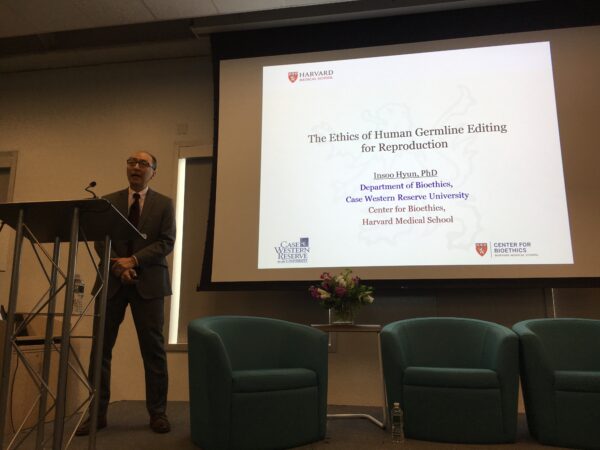
Insoo Hyun speaks at MedCity CONVERGE in Philadelphia on June 19, 2019
Gene editing has raised tough ethical questions for as long as the idea has been around, even trickling into popular culture through the 1997 movie “Gattaca” and some episodes of “Star Trek: Deep Space Nine” exploring the life of genetically enhanced character Dr. Julian Bashir, played by Alexander Siddig.
But recent events have brought the ethics of germ-line gene editing to the forefront of public discourse, in particular thanks to the revelation in November 2018 that a Chinese scientist, He Jiankui, used CRISPR-Cas9 technology to edit the genomes of twin girls to make them immune to HIV. That case was a focus of a presentation Wednesday at the MedCity CONVERGE conference in Philadelphia by Insoo Hyun, associate professor of bioethics at Case Western Reserve University.
Hyun pointed to one potential unintended consequence of He’s experiment that is illustrative. The scientist modified the CCR5 gene so that it would carry a mutation that is known to confer resistance to infection with HIV-1. While on the surface that would seem beneficial, Hyun pointed out that people who carry that mutation are also more susceptible to infection by West Nile virus and likely to die at a younger age.
A similar case – that of Russian scientist Denis Rebrikov, who has proposed gene editing in women with HIV who are poor responders to antiretroviral drugs – also brings up an important question: What are some potential alternatives to gene editing? Even without antiretroviral drugs, the risk of a mother transmitting the virus to her baby in the womb or during childbirth is 15 percent, with the risk lowered further if a C-section is used or the newborn is given ARVs, Hyun noted.
On the one hand, existing guidelines state that germ-line gene modification could be permissible in cases of preventing serious diseases when there are no reasonable alternatives available, as long as the genes are only converted to versions that are prevalent in the general population. However, that calls for discussions about what constitutes a serious disease or a reasonable alternative to genetic modification, Hyun said.
Other issues raised include the ethics of animal and plant gene editing, such as reviving long-extinct species or making non-human primates more similar to humans, which would effectively constitute creating new species. “That’s probably a little higher on ethics radar than human stuff,” Hyun said.
Photo: Alaric DeArment, MedCity News















